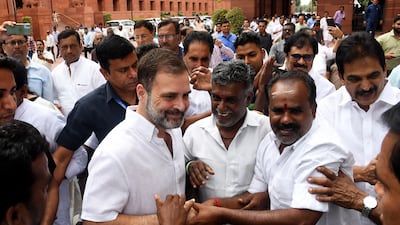Ever since Indian Prime Minister Narendra Modi won the 2014 general election in a landslide, the same questions have been asked time and again. Can Rahul Gandhi, India’s leading opposition figure for the past decade, take on Mr Modi? And if not Mr Gandhi, then who?
Ten months ahead of the 2024 vote, the same tired set of queries is being posed on mainstream and social media. It is a trap both Mr Gandhi and the newly assembled alliance of opposition parties will do well to avoid.
To begin with, the fundamental premise of these questions is flawed. India is a parliamentary democracy, in which the largest party or coalition of parties to emerge after an election approaches the President, the titular head of the republic, and secures the right to form a government.
In other words, this isn’t a presidential contest – as happens in the US or Turkey.
And yet, we live in the real world – where Indians have, over three eras in their country’s post-colonial history, sought to choose a “strong and decisive leader” as prime minister so that he or she can “get things done” through sheer force of personality. Mr Modi – much like India’s first prime minister, Jawaharlal Nehru, and his daughter, Indira Gandhi – towers head and shoulders over all his peers, across party lines.
Nine years of incumbency don’t appear to have shaken the people’s confidence in him either. According to the Lokniti-CSDS Survey released at the end of May, 43 per cent of respondents would elect Mr Modi again. His nearest rival was Mr Gandhi, at 27 per cent, with other leaders registering in the single digits.
It is little wonder, then, that the governing Bharatiya Janata Party is making the 2024 election a referendum on Mr Modi’s leadership – just as it did during his re-election campaign in 2019.
The BJP has benefited from portraying Mr Gandhi as the privileged scion of the Nehru-Gandhi dynasty, claiming he is in politics only because the party he leads – the Indian National Congress – is little more than a family firm. Mr Modi, on the other hand, has been self-made throughout his political career.

But Mr Gandhi, who for years struggled to break out of the pigeonhole the BJP created for him, has finally managed an image transformation after his hugely successful Unite India Rally. He undertook a 4,000-kilometre walkathon across the length of India that began late last year and spanned almost 150 days.
The journey, punctuated with soaring speeches and rich interactions with the public, celebrities, civil society members and former bureaucrats, established his pre-eminence not just in his own party but also among leaders of other opposition parties that have spent the past decade co-opting some of the Congress’s shrinking vote base.
Mr Gandhi has continued to be in the news lately. In March, a lower court ruled that he had defamed all people with the same surname as Mr Modi in remarks that he made during an election speech in 2019. The court in Gujarat, Mr Modi’s home state, sentenced Mr Gandhi to two years in jail. As per the law, he was consequently disqualified from parliament.
But the Supreme Court’s suspension of his conviction last week, and his subsequent reinstatement as an MP this week, could be both good news and bad for the anti-BJP voters – who make up 60 per cent of the electorate.
For the past six months, an emboldened Mr Gandhi has been hitting the BJP hard over a range of issues. He has accused them of fuelling religious polarisation, undermining democratic institutions, and indulging in what he claims to be crony capitalism.
His political resurgence, and the fact he has been consistently in the news, has undoubtedly revived the Congress’s fortunes in recent state and local body elections by creating a buzz among those who are ideologically opposed to Mr Modi. But counterintuitively, it might also serve the BJP to revive the “Modi versus Gandhi” head-to-head contest in the general election and, in the process, distract the electorate from bread-and-butter issues, such as price rise, unemployment and rural distress.
BJP MPs were already targetting Mr Gandhi during this week’s parliament sessions, and an op-ed penned by a BJP leader appeared in one of India’s largest mainstream dailies, in which he critiqued the Congress leader’s record as an MP.

All this might worry some of the leaders in the recently constituted 26-party coalition named the Indian National Developmental Inclusive Alliance – or simply “India” – of which Congress is one. The alliance was formed during Mr Gandhi’s suspension, and he clarified that he wasn’t seeking to become its prime ministerial candidate.
The question is, will that change now that Mr Gandhi is back in Parliament? Rajasthan Chief Minister Ashok Gehlot, one Congress’s most senior and powerful leaders, last week said: “For us, Rahul Gandhi is the PM face.”
To be sure, Mr Gehlot will point to the fact that Mr Gandhi has been one of the government’s most high-profile critics. He might also suggest that Mr Gandhi, more than any other leader in the country, has stood up to defend the republic’s secular underpinnings – which the BJP’s rise has challenged, given the party’s ideological emphasis on Hindu cultural prominence.
And yet, when there is a wealth of talent in the India alliance, with leaders with far more political and administrative heft and experience, the Congress shouldn’t be rocking an already rickety boat that includes parties with competing interests and vote banks. They should, instead, focus on offering a coherent message, displaying opposition unity, and talking about bread-and-butter issues.
After almost a decade of a Modi-led government, it might also be the time for the opposition to test the proposition that, given India’s size and the array of challenges it faces, a “team” with a deep bench might be a better proposition for the voters.


